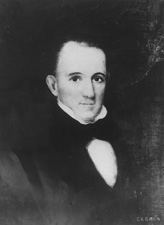Arthur P. Bagby
This article includes a list of general references, but it lacks sufficient corresponding inline citations. (May 2020) |
Arthur Pendleton Bagby | |
|---|---|
 | |
| U.S. Minister to Russia | |
| In office January 14, 1849 – May 14, 1849 | |
| President | James K. Polk Zachary Taylor |
| Preceded by | Ralph I. Ingersoll |
| Succeeded by | Neill S. Brown |
| 10th Governor of Alabama | |
| In office November 30, 1837 – November 22, 1841 | |
| Preceded by | Hugh McVay |
| Succeeded by | Benjamin Fitzpatrick |
| Member of the Alabama House of Representatives | |
| In office 1821–1822 1824 1834–1836 | |
| Member of the Alabama Senate | |
| In office 1825 | |
| United States Senator from Alabama | |
| In office November 24, 1841 – June 16, 1848 | |
| Preceded by | Clement Comer Clay |
| Succeeded by | William R. King |
| Personal details | |
| Born | 1794 Louisa County, Virginia, US |
| Died | September 21, 1858 (aged 63–64) Mobile, Alabama, US |
| Political party | Democratic |
Arthur Pendleton Bagby (1794 – September 21, 1858) was[1] the tenth Governor of the U.S. state of Alabama from 1837 to 1841. Born in Louisa County, Virginia, in 1794, he studied law and was admitted to the bar in 1819, practicing in Claiborne, Alabama. He was a member of the Alabama State House of Representatives in 1821, 1822, 1824, and 1834–1836, serving as the youngest-ever speaker in 1822 and 1836, and he served in the Alabama State Senate in 1825. A slaveowner, he served in the U.S. Senate from November 21, 1841, when he was elected to fill the vacancy caused by Clement C. Clay's resignation, to June 16, 1848, when he resigned to become Minister to Russia from 1848 to 1849.
During his time in the Senate, he was chairman of the Committee on Territories, the Committee on Claims, and the Committee on Indian Affairs. As a Senator, he supported the annexation of Texas. Bagby died in 1858 in Mobile, Alabama, and he is interred in Magnolia Cemetery there.
Panic of 1837
[edit]During Bagby's administration, the country was plagued by economic depression due to the Panic of 1837. Bagby introduced measures to assist the state banks, but the state legislature rejected most measures. All the state banks were closed by Bagby's successor, Governor Benjamin Fitzpatrick.[2]
Arthur P. Bagby, Jr.
[edit]His son, Arthur P. Bagby, Jr., was a Confederate colonel in the Civil War, who was assigned to command as a brigadier general on April 13, 1864, to rank from March 17, 1864, and as a major general on May 16, 1865, to rank from May 10, 1865, by General Edmund Kirby Smith in the Trans-Mississippi Department. Neither appointment was confirmed by the Confederate Senate, which had held its final session before the major general assignment.
Bagby's first wife, Emily Steele of Georgia, died in 1825 and is buried in Claiborne, Alabama.
References
[edit]- ^ "Congress slaveowners", The Washington Post, 2022-01-19, retrieved 2022-01-24
- ^ "Arthur Pendleton Bagby". Alabama Department of Archives and History. Retrieved 2012-06-23.
Sources
[edit]- United States Congress. "Arthur P. Bagby (id: B000030)". Biographical Directory of the United States Congress. Retrieved on 2008-08-10
- Eicher, John H., and David J. Eicher, Civil War High Commands. Stanford: Stanford University Press, 2001. ISBN 0-8047-3641-3. p. 588.
- Craig H. Roell: Bagby, Arthur Pendleton from the Handbook of Texas Online. Retrieved December 23, 2008.
External links
[edit]- United States Congress. "Arthur P. Bagby (id: B000030)". Biographical Directory of the United States Congress.
 "Bagby, Arthur Pendleton". The Biographical Dictionary of America. Vol. 1. 1906. p. 181.
"Bagby, Arthur Pendleton". The Biographical Dictionary of America. Vol. 1. 1906. p. 181.- "Arthur P. Bagby". Find a Grave. Retrieved 2008-08-10.
- Alabama Department of Archives and History Archived 2017-01-03 at the Wayback Machine
- Address of His Excellency Governor Bagby, when inducting into office the president of the University of Alabama; together with the address of the president, Rev. Basil Manly. Delivered in the Rotunda, on commencement day, December 6, 1837, Tuscaloosa, Ala., Ferguson & Eaton, Printers, 1838. From the University Libraries Division of Special Collections, The University of Alabama.
- 1794 births
- 1858 deaths
- People from Louisa County, Virginia
- Democratic Party governors of Alabama
- Democratic Party members of the Alabama House of Representatives
- Democratic Party Alabama state senators
- Alabama lawyers
- Ambassadors of the United States to the Russian Empire
- Democratic Party United States senators from Alabama
- 19th-century American diplomats
- Speakers of the Alabama House of Representatives
- 19th-century American politicians
- 19th-century American lawyers



